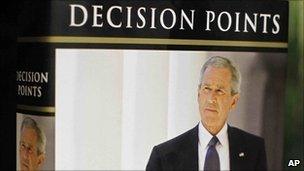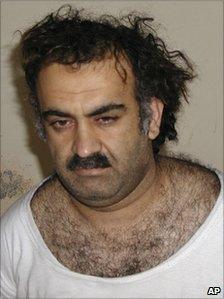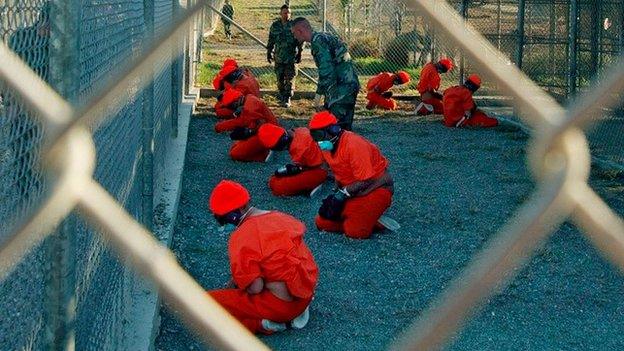George W Bush claims UK lives 'saved by waterboarding'
- Published
British lives were saved by the use of information obtained from terrorist suspects by "waterboarding", according to former US President George W Bush.
In his memoir, he said the simulated drowning technique had helped to break plots to attack Heathrow Airport and Canary Wharf in London.
A Number 10 spokeswoman declined to comment directly on the claims but said it classed waterboarding as torture.
"We don't condone it [torture], nor do we ask others to do it on our behalf."
Mr Bush's memoir, Decision Points, is being serialised in the Times.
In an interview with the paper, external the former president said: "Three people were waterboarded and I believe that decision saved lives."

In his book, Mr Bush focuses on 14 major decisions of his life and presidency
He confirmed he had authorised the use of waterboarding to extract information from Khalid Sheikh Mohammed, the al-Qaeda mastermind behind the 9/11 attack.
Mr Bush tells the paper: "Damn right!
"We capture the guy, the chief operating officer of al-Qaeda, who kills 3,000 people. We felt he had the information about another attack.
"He says, 'I'll talk to you when I get my lawyer'. I say, 'What options are available and legal?'"
In the book, Mr Bush writes: "Their interrogations helped break up plots to attack American diplomatic facilities abroad, Heathrow airport and Canary Wharf in London, and multiple targets in the United States."
Mohammed was one of three al Qaeda suspects subjected to waterboarding, alongside Saudi Arabia-born Abu Zubaydah and Abd al-Rahim al-Nashiri.
He endured the near-drowning technique as CIA agents tried to obtain information following his capture in Pakistan in March 2003.
Attacks on Heathrow, Big Ben and Canary Wharf were included in a detailed list of 31 plots Mohammed confessed to during a later hearing at Guantanamo Bay prison - where he remains.
He also admitted a role in the 2002 Bali nightclub bombings, an attack on a Kenyan hotel in the same year and the beheading of Wall Street Journal reporter Daniel Pearl in Pakistan.
The UK government has said it "stands firmly against torture and cruel, inhuman and degrading treatment or punishment," including waterboarding.
A spokeswoman said the prime minister had set out his views in a statement to Parliament in July and had set up the Gibson review to establish whether any intelligence officers had been aware information had been gained in this way.
Amnesty International said waterboarding was "absolutely prohibited under international law".
Amnety's UK director Kate Allen said Mr Bush's remarks were "self-serving and misguided", adding that any information extracted through torture was "notoriously unreliable and inadmissible".
Earlier former Labour chairman of the Commons intelligence and security committee Kim Howells told the BBC while he did not doubt the existence of plots, he doubted whether waterboarding provided information instrumental in preventing them coming to fruition.
He said the difficult issue was whether all the UK's intelligence partners had as scrupulous an attitude towards torture.
"We've just had what looks like a very valuable tip-off from Saudi Arabia. We get a huge amount of intelligence coming from Pakistan.

Al-Qaeda's 'mastermind' was waterboarded by the CIA
"These are countries where there's a very different attitude to the way in which prisoners are treated in their jails. Just as in China," he said.
Former Tory shadow home secretary David Davis said if a government comes by information that affects people's security, it had to be used.
He added: "What we shouldn't do, ever, is encourage it (torture)."
He said a large part of the false intelligence on WMD that led to the war in Iraq came from torture and illegal rendition.
"That's the problem - people under torture tell you what what you want to hear. Apart from being immoral, apart from destroying our standing in the world... it doesn't deliver."
In October, the head of MI6 Sir John Sawers said torture was "illegal and abhorrent under any circumstances and we have nothing whatsoever to do with it".
He outlined the "real, constant operational dilemmas" faced by his organisation in trying to avoid intelligence gathered by torture.
He said: "If we know or believe action by us will lead to torture taking place, we're required by UK and international law to avoid that action, and we do, even though that allows that terrorist activity to go ahead.
But he added: "Suppose we received credible intelligence that might save lives, here or abroad. We have a professional and moral duty to act on it. We will normally want to share it with those who can save those lives."
In Mr Bush's interview with The Times, the 64-year-old former president described his close relationship with Tony Blair, but was dismissive of public opinion in Britain about the war in Iraq.
"It doesn't matter how people perceive me in England. It just doesn't matter any more. And frankly, at times, it didn't matter then," he said.
Mr Bush said when Mr Blair faced a possible vote of no confidence in Parliament on the eve of war, he offered him the chance to opt out of sending British troops into Iraq.
However, Mr Blair told him: "I'm in. If it costs the government, fine."
Mr Bush said he still had "a sickening feeling" about the failure to find weapons of mass destruction in Iraq.
But he defended his decision to invade Iraq, saying Iraqi citizens were better off without the former Iraqi leader Saddam Hussein and the US was better off without Saddam pursuing biological or chemical weapons.
Mr Bush admits that he was shocked when no weapons of mass destruction were found in Iraq after the 2003 invasion.
But asked, in an interview with NBC, external, if he ever considered apologising to Americans for that failure to find WMD, he said: "Apologising would basically say the decision was a wrong decision.
"And I don't believe it was the wrong decision."
And speaking about his absence from the media spotlight since leaving office until the publicity surrounding the publication of his book, he told NBC: "I just didn't want to get out there any more. I didn't want to get back into what I call 'the swamp'."
- Published9 November 2010
- Published28 October 2010
- Published10 December 2014

- Published8 November 2010
- Published3 November 2010